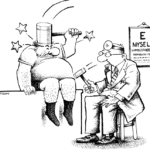GRAMMAR/USAGE
Sore Thumb Grammar Errors
Avoiding “bad English” grammar errors

Strictly speaking, any deviation from standard written English, regardless of how minor it may be, is an “error. Certain errors, however, are more obvious than others, and, as such, will often induce your readers or listeners to make unkind and unwarranted assumptions about your intelligence and educational background,
Zeroing In
Here’s a brief look at some of the most obvious of these grammar missteps.
DOUBLE NEGATIVES
The error: Using two words negative words in the same sentence or clause.
Discussion: Two negative words in the same sentence or clause converts a negative thought into a positive thought.
Exception: This rule doesn’t apply when the two negatives in the same sentence are in separate clauses.
This:I don’t have
Or: I have nothing more to say about this subject.
But: I don’t see any reason why we shouldn’t be excused for making bad grammar errors. (The two negative constructions are in different clauses).
TACKY PREPOSITIONS
The error: Ending a sentence with an unneeded preposition—and, in particular, “to” or “at”.
Discussion: More of than not, a preposition at the end of a sentence has no bearing on the meaning of the sentence.
This: Where did everybody go
Instead of: Where do you work at? (no need for “at”)
This: Where do you work at?
Exception: “Who should I send my suggestion to?” ends with a preposition but is a grammatically acceptable alternative to the more formal “to whom should I send my suggestion”?
SUPERFLUOUS PRONOUNS
The error: Inserting an unnecessary pronoun between a subject and its verb.
Discussion: This error is far more common in speech than in writing.
Instead of: My new boss she is a stickler for details. (No need for “she”).
This: My new boss she is a stickler for details.
Exception: When the purpose of the pronoun that follows the subject is to emphasize word that precedes it.
This: I myself will be overseeing this project.
UNNECESARY USE OF “WHEN” or “WHERE
Discussion: Neither of these two adverbs should ever operate as a conjunction.
This: A bridge loan is
“ME” AS THE SUBJECT
“Me” is the objective case form of the first person pronoun (“I”) and should never function as the subject of a verb.
This: My older sister and
Instead of: Molly and me have been best friends more than 10 years.
This: Molly and I (A first person pronoun in the nominative case.) have been close friends more than 10 years.
WAS VS WERE
“Was” and “were” are the past tense forms of the helping verb “to be”, but they are not interchangeable. “Was” is the proper choice when its subject is either a singular noun or one of the following singular pronouns: “I”, “he”, “she” or “it”. “Were” is the proper choice when the subject is plural noun or is one of the following pronouns: “you”, “we”, or “they”.
Instead of: We was hoping to get together with next week. (“was” is never the proper choice when the subject is a plural noun or pronoun)
This: We (plural pronoun) ) were hoping to get together with you next week:
WHO VS THAT
“Who” and “that” are so-called demonstrative pronouns that perform the same grammatical function: “Who” is the better choice when the word that follows is a person or a group of people. “That” is the better choice when the word that follows is an item.
This: company I would like to talk to the person in your company who (a person))handles refunds.
But: Have you read the book ) that (an item, not a person) I mentioned to you yesterday.
WHOM VS WHO
Whom is the objective case form of “who” and, regardless of how “correct” it may sound, should never be used when it is the subject of a verb.
This: May I ask